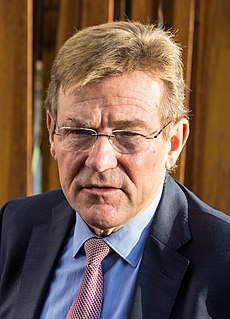
The politics of Belgium take place in the framework of a federal, representative democratic, constitutional monarchy. The King of the Belgians is the head of state, and the prime minister of Belgium is the head of government, in a multi-party system. Executive power is exercised by the government. Federal legislative power is vested in both the government and the two chambers of parliament, the Senate and the Chamber of Representatives. The federation is made up of (language-based) communities and (territorial) regions. Philippe is the seventh and current King of the Belgians, having ascended the throne on 21 July 2013.
The Reformist Movement is a liberal French-speaking political party in Belgium. MR is traditionally a conservative-liberal party, but it is also evaluated as a social-liberal party.

DéFI is a social-liberal, liberal, regionalist political party in Belgium mainly known for defending French-speakers’ interests in and near the Brussels region. The party is led by François de Smet, a member of the Chamber of Representatives. The party's current name, DéFI or Défi, was adopted in 2016 and is a backronym of Démocrate, Fédéraliste, Indépendant meaning "challenge" in French.

The Socialist Party is a social democratic French-speaking political party in Belgium. As of the 2019 elections, it is the third largest party in the Belgian Chamber of Representatives and the largest Francophone party. The party is led by Paul Magnette. The party supplies the Minister-president of the French Community, and the Brussels-Capital Region. In the German-speaking community, the party is known as the Sozialistische Partei (SP).

Frédérique Ries is a Belgian politician and Member of the European Parliament for the French Community of Belgium with the MR/MCC/PRL, part of the Alliance of Liberals and Democrats for Europe.
The politics of Wallonia concern the government of Wallonia, that is the southern Region of Belgium.

The Dutch-speaking electoral college is one of three constituencies of the European Parliament in Belgium. It currently elects 12 MEPs using the D'Hondt method of party-list proportional representation. Previously it elected 13 MEPS, until the 2013 accession of Croatia. Before that, it elected 14 MEPs, until the 2007 accession of Bulgaria and Romania.

Federal elections were held in Belgium on 10 June 2007. Voters went to the polls in order to elect new members for the Chamber of Representatives and Senate.

The Union of Francophones is a political party in Belgium that participates as electoral lists in regional, provincial, and municipal elections in the Flemish Province of Flemish Brabant. As its name suggests, its primary target is the French-speaking community of Flemish Brabant and particularly those who live in the officially Dutch-speaking area Halle-Vilvoorde including the now predominantly French-speaking municipalities with language facilities in the Brussels Periphery. Its main goal is to provide both constitutional exemptions for and privileges to Francophones living in Dutch-speaking Flanders, for example by annexing the municipalities with language facilities to the officially bilingual Brussels-Capital Region.

The 2009 European Parliament election in Belgium was on Sunday 7 June 2009 and was the election of the delegation from Belgium to the European Parliament. The elections were on the same day as regional elections to the Flemish Parliament, Walloon Parliament, Brussels Parliament and the Parliament of the German-speaking Community.

Federal elections were held in Belgium on 13 June 2010, during the midst of the 2007-11 Belgian political crisis. After the fall of the previous Leterme II Government over the withdrawal of Open Flemish Liberals and Democrats from the government the King dissolved the legislature and called new elections. The New Flemish Alliance, led by Bart De Wever, emerged as the plurality party with 27 seats, just one more than the francophone Socialist Party, led by Elio Di Rupo, which was the largest party in the Wallonia region and Brussels. It took a world record 541 days until a government was formed, resulting in a government led by Di Rupo.

The Leterme II Government was the federal government of Belgium from 25 November 2009 to 26 April 2010, and the caretaker government until 6 December 2011. It took office when the Flemish Christian Democrat Yves Leterme (CD&V) was sworn in as Prime Minister. It followed the Van Rompuy I Government which ended when Herman Van Rompuy became the first President of the European Council. It comprised five parties: the Dutch-speaking Christian Democratic and Flemish (CD&V), the Dutch-speaking Open Flemish Liberals and Democrats, the French-speaking liberal Reformist Movement (MR), the French-speaking Socialist Party (PS) and the French-speaking Humanist Democratic Centre (CDH).

The Belgian provincial, municipal and district elections of 2012 took place on 14 October. As with the previous 2006 elections, these are no longer organised by the Belgian federal state but instead by the respective regions:

The Di Rupo Government was the federal cabinet of Belgium sworn in on 6 December 2011, after a record-breaking 541 days of negotiations following the June 2010 elections. The government included social democrats (sp.a/PS), Christian democrats (CD&V/cdH) and liberals, respectively of the Dutch and French language groups. The government notably excluded the New Flemish Alliance (N-VA), the Flemish nationalist party which achieved a plurality and became the largest party. Its absence, together with the unwillingness of Open Vld to enter into an eight-party coalition that included the green parties, caused the government coalition to lack a majority in the Dutch language group. It was the first time that the Belgian prime minister had been openly gay, as Di Rupo became the world's first male openly gay head of government. Elio Di Rupo also became the first native French-speaking prime minister since 1979 and the first prime minister from Wallonia since 1974 and first socialist prime minister since 1974.
Federal elections were held in Belgium on 25 May 2014. All 150 members of the Chamber of Representatives were elected, whereas the Senate was no longer directly elected following the 2011–2012 state reform. These were the first elections held under King Philippe's reign.
Regional elections were held in Belgium on 25 May 2014 to choose representatives for the Flemish Parliament, Walloon Parliament, Brussels Parliament and the Parliament of the German-speaking Community. These elections were held on the same day as the 2014 European elections as well as the 2014 Belgian federal election.

The 2014 European Parliament election in Belgium is an election held on 25 May 2014 in the three Belgian constituencies: the Dutch-speaking electoral college, the French-speaking electoral college and the German-speaking electoral college. This election was held on the same day alongside the Belgian federal election and the Belgian regional elections.

Federal elections were held in Belgium on 26 May 2019, alongside the country's European and regional elections. All 150 members of the Chamber of Representatives were elected from eleven multi-member constituencies.

The 2019 Belgian regional elections took place on Sunday 26 May, the same day as the 2019 European Parliament election as well as the Belgian federal election.
















